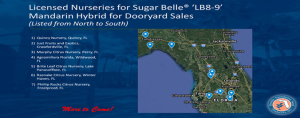Florida citrus is a hot commodity not just for Floridians but for the overall United States. However, the most gratifying feeling is being able to pick your own fruit fresh from your yard. UF/IFAS has been working diligently to provide farmers and homeowners with citrus varieties that can tolerate the destructive Citrus Greening (Huanglongbing or HLB) disease. What does that mean for you? Well, first you need to know some popular citrus types that we all favor as a wonderful snack.
Citrus Types:
Sweet Oranges:
Typically used for juicing, sweet oranges are a homeowners go to. The recommendation is to incorporate three maturity seasons into your home landscape such as a Hamlin, Navel, Pineapple, and Valencia. By doing this you can enjoy the fruits of your labor from November to July.
Grapefruits:
Grapefruit is another consumer favorite of the citrus family. Grapefruit trees can produce well with a single tree however, they succumb to Citrus Greening quicker than their orange counterparts. Good grapefruit varieties to test out would be ‘Duncan’, ‘Redblush’, ‘Marsh’ and ‘Flame’.
Acid Fruits:
Typically, acid fruits are not recommended for home growing as they succumb to scab frequently. However, limes such as ‘Tahiti’ , ‘West Indian’, ‘Meyer’ lemons, ‘Eustis’, and ‘Lakeland’ limequat are great options for homeowners to dabble in.
Citrus Problems
It is not unnatural to encounter citrus issues as your plant matures. Some diseases that affect citrus plants are citrus canker, scab, sooty mold, melanose, or varying nutrient deficiencies. Aside from disease issues pest tend to enjoy citrus plants just as we do. Aphids, leafminer, citrus psyllid, and scales can make a cozy home among your citrus trees. The best practice for controlling these problems would be to scout frequently for any signs of insect or disease damage so you are aware of how to treat the problem.
Here are a few UF approved nurseries that sell citrus plants to homeowners.
- Adam’s Plants
- Brite Leaf Citrus Nursery, LLC
- Chestnut Hill Tree Farm, Inc.
- Just Fruits and Exotics
- Lora’s Lovely Plants
- Oasis Tropical Plants and Trees
- Phillip Rucks Citrus Nursery, Inc.
- Twigs and Berries Nursery

Growing citrus trees at home can be a successful endeavor if you keep these steps in mind:
- Proper tree selection
- Site preparation
- Establish a watering schedule
- Timely fertilization
- Integrated pest management schedule
Good luck and happy growing!
For more information on home citrus production see the links below:
- https://crec.ifas.ufl.edu/research/citrus-production/disease-identification/citrus-greening-huanglongbing/
- https://crec.ifas.ufl.edu/home-citrus/
- https://edis.ifas.ufl.edu/publication/HS132
For more information on urban horticulture programs and the Master Gardener Volunteer Program in Volusia County, contact Brittany A. Council-Morton via email at bcouncil1@ufl.edu or phone at 386-822-5778.
Source: UF/IFAS Pest Alert
Note: All images and contents are the property of UF/IFAS.



